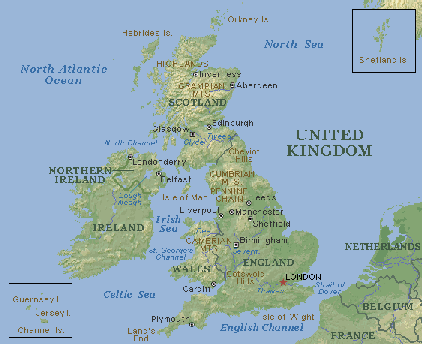
English has changed a lot! The basis of the English language is found in ancient Sanskirt. The island of England was occupied by five different groups of people before it developed as an independant nation. There are three periods of the English language. Old English was from 450-1150.
Middle English was from 1150-1500. Modern English was from 1500 to the present.
5000 B.C. Sanskirt - A language of ancient India that belongs to the Indo-European Language Group.
India has preserved samples of their language that are older than any European language, but there are some features in common.
unkown Celts - There is definite proof that these were the first people in England.
55 B.C. Romans - This was the first recorded instance of the Romans being in England,
but they did not conquer England until 78-85 A.D. They stayed in control of the island for 300 years.
4th century and 449 Saxons - They were the most prominent group of the Germanic tribes that invaded England.
The other two main tribes were the Angles and the Jutes. The word England is derived from the word Angles (Engles).
787-850; 850-878; 878-1042 Vikings - The Vikings invaded Britain in three different stages:
The first wave consisted of raids by small, isolated bands. They concentrated on destroying towns close to the coast.
The second wave was filled with large armies that caused wide-spread destruction and plundering.
This stage ended when King Alfred defeated Gunthrum and made the Treaty of Wedmore.
The third wave overpowered England. The English people had to bride the invaders not to raid.
The Vikings set up Cnut to be king. He was the Danish ruler who began a twenty-five year stretch of Danish rulers in England.
1066 Normans
OLD ENGLISH (450-1150)
597 St. Augustine - He wanted to convert Britain to Christianity. This influenced the English language because
it introduced many new religious words and concepts to the English people. These words were based on examples
from Latin and Greek. These two classic languages brought a large influence to the English tongue.
731 Bede - He was known as the Venerable. He wrote Ecclesiastical History of the English People to help teach the people about their history.
871-899 King Alfred
878 Danelaw and Treaty of Wedmore
1014 Aethelred the Unready - He was driven out of England by the Danes.
He had married a Norman woman so he sought refuge with his brother-in-law, the Duke of Normandy.
1042 Edward the Confessor - He was the son of Aethelred. He grew up in France.
When he was restored to the English throne he wanted to incorporate many of the French ways and give high positions to his Norman friends.
An Example of the Old English language
MIDDLE ENGLISH (1150-1500)
1204 The Hundred Years' War - A war between England and France. It had a significant impact on the development of English because France
became the enemy. The English people didn't want to use French words or terms anymore so the upper class began to want to learn and speak English.
1342-1400 Chaucer
1348 The Black Death - The disease that killed a vast majority of the people. It had a significant impact on the development of English because
since so many people died there was a shortage of laborers. Because laborers were valued more, their language became more important too.
The lower class moved up to the middle class and brought their language to a higher status too.
1362 Statute of Pleading - This law is the offical recognition of the English language in England.
Parliament was opened with its first speech made in English in this year.
An example of the Middle English language
MODERN ENGLISH (1500-present)
1564-1616 Shakespeare
1604 Cawdry - He wrote the first dictionary of hard words.
1712 Academy - A group of people who were the guardians and rule-makers of the English language.
It reached its height when Dean Jonathan Swift wrote his Proposal. The idea failed however, and gave way to the prominence of dictionaries.
1755 Samuel Johnson - He wrote a dictionary, which he hoped would help refine the English language.
1758-1843 Noah Webster
1828 Webster's Dictionary
1822 Grim's Law - Jacob Grim found that Germanic consonants are tied to Sanskirt, Greek and Latin.
His law states that there was a sound change sometime after the Germanic language broke from the neighboring dialects of the parent tongue.
1858 The Oxford English Dictionary (OED)- It was orginally known as A New English Dictionary on Historical Principles (NED).
It took forty-four year to compile the first edition and it is updated about every forty years.
An example of the Modern English language
Created by Ruth Schwartz
Last updated: 5/9/00; 7/15/02
Sources: Baugh, Albert C. and Thomas Cable. A History of the English Language. Englewood Cliffs: New Jersey, 1993.
Some useful links
History of the English Langauge
Sir Thomas Malory
History of the Monarchy